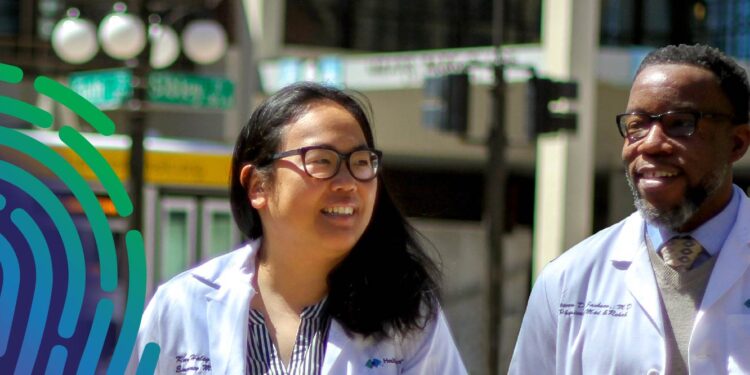[ad_1]
From way back to kindergarten, Andrea Singh advised folks she wished to be a pediatrician. Following a lifelong ardour of serving to folks be taught, the mixture of science, advocacy and educating that pediatrics affords proved to be an ideal match for Andrea. All of that is motive sufficient to know why Dr. Singh, now the division chair of pediatrics at Park Nicollet and the co-lead of the HealthCompanions Children’s Health Initiative, is such a passionate champion for the health of youngsters. But this drive to deal with disparities in pediatric care additionally comes from a private place.
As a baby of immigrants from the South American nation of Guyana, Andrea confronted lots of inner challenges integrating the cultures of each her West Indian household and Minnesotan dwelling. It’s a wrestle that she acknowledges within the more and more various sufferers she sees right this moment. Fortunately, it’s additionally a possibility for Dr. Singh to assist others perceive youngster growth on the intersections of various cultures and background experiences and the way it contributes to the distinctive and constructive identities that carry into maturity.
It’s this drive that informs Dr. Singh’s work, creating secure environments to teach sufferers and households about good health whereas additionally acknowledging the cultural limitations that may exist. In right this moment’s Off the Charts, Dr. Singh talks with Dr. Haley and Dr. Jackson about why vaccination disparities exist and how rethinking our approaches to vaccination and building more healthy relationships between medical doctors, sufferers and households can create the belief essential to slender these gaps. Listen to the episode or read the transcript.
The “why” behind the present gaps in childhood vaccinations
When it involves having a accomplished vaccination schedule at age 2, there’s presently a 20% hole between Caucasian kids and youngsters that determine as sufferers of shade. And these disparities aren’t simply nationwide: Even after we assume we’re being equitable, they are often present in our personal states, neighborhoods and health methods. As Dr. Singh relates within the episode, it’s solely when these gaps are acknowledged as actual that we take step one in really closing them in our communities.
But why do these disparities exist now? The first motive is systemic inside health care. If medical doctors aren’t objectively addressing the considerations of all sufferers and mother and father equally and aren’t successfully recommending vaccinations with compassion, main gaps type between completely different teams. Unconscious bias by way of language limitations, ill-translated explanations and cultural misunderstanding also can make vaccination disparities worse.
The second motive is that completely different communities can have completely different hesitations in relation to vaccination. Whether it’s as a result of previous group historical past with vaccinations, considerations about non secular restrictions or basic distrust of health care, understanding these causes is necessary in in search of a path ahead.
Rethinking find out how to method childhood vaccinations
To assist scale back disparities in childhood vaccinations, pediatricians want to contemplate how they’re speaking concerning the topic with mother and father and sufferers. Standardizing approaches to discussing childhood vaccinations and making suggestions universally acceptable and comprehensible is an effective start, serving to to deal with each unconscious bias and group hesitation.
But whereas there are methods to make progress on a broader stage, closing vaccination gaps can be tackled by way of on a regular basis examination room conversations. By being open, sincere and upfront about vaccination whereas listening and responding with compassion to affected person considerations and hesitations, medical doctors can create a respectful setting the place everybody feels heard.
It’s additionally essential to make the “why” of vaccination private. To encourage her sufferers, Dr. Singh talks concerning the analysis, information and the reason why each she and her kids bought their vaccinations. By discussing the choice in a secure place, Dr. Singh’s sufferers can really feel snug making their very own knowledgeable selections with out feeling animosity or judgement in the event that they nonetheless say “no.”
As Dr. Singh says throughout the podcast, “I tell people all the time [that] 99.9% of the parents that I have come across in my almost 20-year career are parents that love their children. And when parents make decisions for their kids, they’re doing it out of love. They think that they are making the best choice.” When it involves vaccine hesitation, Dr. Singh says that medical doctors like her “really have to stop and listen and not judge, and not say ‘OK, well, you don’t care about your kid, therefore you’re not doing what I recommend.’” Instead, by relating her “why,” she will present her recognition that whereas the state of affairs of every affected person and household is completely different, “the common circumstance we have is that we love our kids, and we would do anything for our kids.”
Building relationships, building belief
And it’s that recognition and empathy that helps construct belief between Dr. Singh and her sufferers – the sort of belief that comes from relationships created over time. It’s additionally a belief that has completely different parts, from making a medical area that’s snug, inviting and safe to talking truthfully and straight about topics like vaccination. It’s this constant method and maintained setting that builds the boldness of fogeys of their physician’s honest motivation – the health of their youngster.
It’s additionally in these relationships the place gaps in care may be closed, however not by way of pressure. As Dr. Singh says within the episode, she has good relationships with households that aren’t prepared for vaccinations. In these instances, she is aware of that it’s necessary to proceed having the dialog, however it’s additionally necessary for these mother and father to know that she’s not going to push them into one thing they don’t really feel snug doing. Otherwise, that may break the belief that’s been constructed, making it harder if their youngster faces an pressing health emergency.
However, if vaccinations aren’t mentioned, the reply will at all times be “no.” It’s value it to proceed educating her sufferers and speak about her personal private “why.” Eventually, the respect and understanding proven on each side of the chart can repay, leading to more healthy and extra resilient kids, no matter their ethnicity.
To hear extra from Dr. Singh, together with what she likes to say to a child sitting in her examination room chair, what her favourite new query for sufferers and mother and father is, and why being asked to “spill the tea” is a perfect situation, take heed to this episode of Off the Charts.
[ad_2]



Discussion about this post